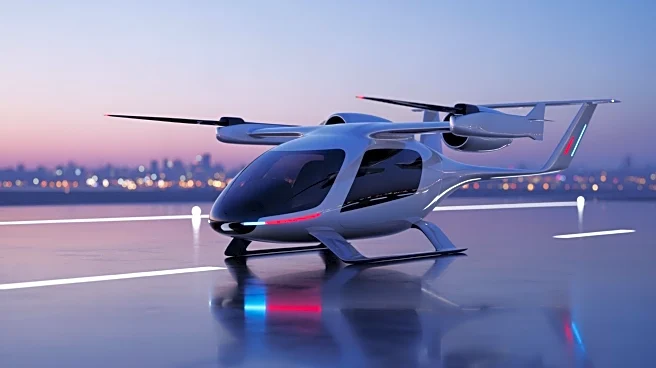What's Happening?
Archer Aviation, a Silicon Valley company, is investing over $125 million to acquire control of Hawthorne Municipal Airport in Los Angeles. This move is part of Archer's strategy to develop electric vertical
takeoff and landing aircraft (eVTOL) for urban air travel. The company aims to use the airport as a testing ground and future hub for air taxis, targeting Los Angeles due to its urban sprawl and traffic congestion. Archer plans to integrate its aircraft into existing transportation systems and has partnered with local organizations to support major events like the 2028 Olympic Games. The acquisition is a significant step in the competitive air taxi industry, which includes other Californian companies like Joby Aviation and Wisk Aero.
Why It's Important?
The investment by Archer Aviation highlights the growing interest in air taxis as a solution to urban congestion and transportation challenges. By establishing a hub in Los Angeles, Archer is positioning itself at the forefront of this emerging industry, which could revolutionize urban mobility. The development of eVTOL technology promises quieter, more efficient air travel, potentially reducing reliance on traditional road vehicles. However, the industry faces challenges such as regulatory approvals, safety concerns, and technological advancements in battery power. Success in this sector could lead to significant economic opportunities and reshape transportation infrastructure in major cities.
What's Next?
Archer plans to use the Hawthorne airport for testing its aircraft and developing AI-powered technology. The company aims to scale its product for mass use within the next 10 to 15 years, with potential operations starting as early as the 2028 Olympics. Regulatory hurdles remain, as the Federal Aviation Administration's certification is crucial for commercial service. Public concerns about noise, safety, and affordability need addressing, and Archer's competitors are also advancing their technologies and market strategies. The future of urban air mobility will depend on successful integration into existing systems and public acceptance.
Beyond the Headlines
The development of air taxis raises ethical and environmental questions, such as the impact on urban landscapes and noise pollution. While companies claim their aircraft are quieter than traditional helicopters, community advocates express concerns about safety and affordability. The industry must navigate these challenges while ensuring equitable access to new transportation modes. Additionally, the integration of AI and autonomous systems in air taxis could lead to broader discussions on technology's role in public safety and privacy.











